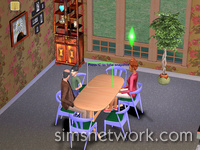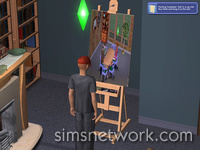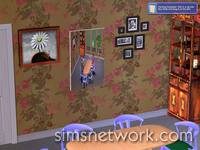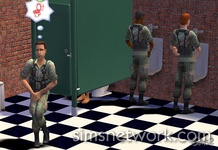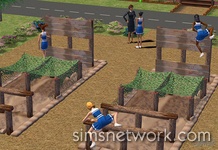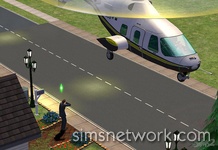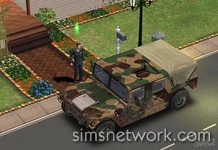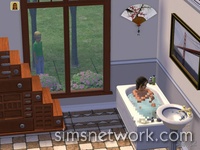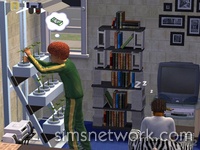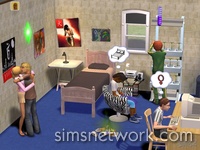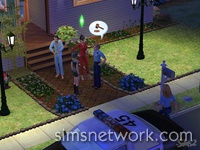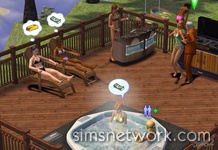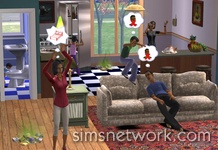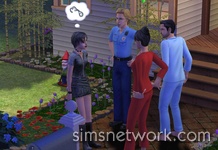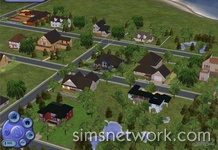Hello everyone,
Happy 2004! We hope that your holiday season was enjoyable and that you're set for another exciting new year. The team has been hard at work adding new features to the game, which you might have already started to read about in the most recent Designer Diary. But of course we saved the best info for our community members:
- Cameraman mode: The new camera in The Sims 2 is huge. The freedom to rotate, zoom, and scroll your camera as you play the game really lets you dive right into the Sims' 3-D world. With the new cameraman mode, you can take it a step further and get even more intimate with your Sims. Move around the environment as if you were a Sim, and get in the thick of the action at the most detailed level. In cameraman mode, you have complete freedom to set up the scene according to your imagination.
- Movie Recorder: We know that telling stories with The Sims has always been a fun and creative aspect for players. With the movie recorder, you can now capture footage straight from the game. By pressing "v" as you play, the game will begin creating avi's of your Sims in action. A complete video control panel is provided that allows you to optimize the settings for the movie recorder, ensuring that your machine is providing the best footage for your stories.
Here is a movie of these new features in action. With new cameras and the recorder to capture all of the action, you are now the director of your own movie. The stories you can create will be more dramatic, more cinematic, and we're willing to bet more creative and entertaining than anything we've ever seen.
Stay tuned for more info from the team next week!
Luc Barthelet
Movie Director, Maxis
News
"Playing The Sims 2 in camera mode is a revelation. You feel like you are there." - Lucy Bradshaw, VP of PC development.
The Sims 2 Designer Diary #6
The designers of The Sims 2 explain how the sequel will let you get a bird's-eye view of your little computer people's lives.
Maxis' unusual strategy game The Sims is reportedly the best-selling computer game of all time, but the team has since stopped making expansion packs and has moved on to develop the sequel. Like the original game, The Sims 2 will let you create a family of computerized people, or "sims," and take control of their lives, their career paths, and their social interactions with other sims. But The Sims 2 will attempt to improve on the original game with a number of intriguing new features, including sims that retain memories and actually grow and change over time. The original game lent itself to many different and unusual situations--some completely absurd, others eerily realistic. The sequel will attempt to give you an even better way to use the game to experience these situations.
The Sims Exposed
By Lucy Bradshaw
VP PC development
Perhaps one of the most surprising things about The Sims is that, besides being a fantastic strategy simulator, it has become one of the most powerful storytelling tools ever created. Even we were taken by how fast people gravitated to this aspect of the game. In retrospect, I guess we should have figured it out. The game had all the classic elements you would need to tell compelling stories: actors, sets, props, and the ability to add your own written thoughts and dialogue to put context to the images you would capture in the game. When we set about designing The Sims 2, we knew that all these elements, and more, had to be available to players so they could bring their stories into the present and future.
Part of compelling storytelling is the ability to immediately take the audience into the action. In the original game, you could do quite a lot to support the stories you created, but you were never completely free from the limitations of the game's camera angles. In The Sims 2, the camera is enormously flexible and cinematic, so you can smoothly rotate and navigate around the scene. You can change the camera angle and zoom in to view sims at eye level. This allows for a great balance between the playability that is crucial in setting the stage and the immersive views necessary for the story to resonate.
Once we initially experienced it for ourselves, we felt we needed to take one more step for those players who really make storytelling the center of their play experience. It was for those players that we decided to completely blow away the old limits and introduced a new way of viewing the game: camera mode. In the camera mode, you can now travel all over the game environment as if you were a sim: run up and down stairs, get behind or under objects, and even get right up into the faces and see the expressions and emotions of the sims who are the stars of your stories.
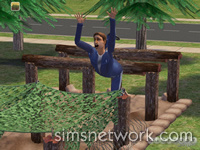 Playing The Sims 2 in camera mode is a revelation. You feel like you are there. It reveals how much work has been done on the little things in the game, like facial expressions, gestures, and textures on objects. Camera mode is all about freedom. Combined with the pause button, it's an immensely powerful tool for creating stories that, for the first time, have a true cinematic and dynamic quality. Lighting, angles, and even the focal length of the camera can all be manipulated to support exactly the right image and to create exactly the right scene that you envision. Instead of observing the game from a somewhat removed perspective, you can now place your viewers directly in the heat of the action. Genres of storytelling within the game that weren't authentic before are available now to the player: horror, suspense, voyeurism, sitcom, and many others we might not have thought of. Hide behind a potted plant to shoot a tender love scene. Position yourself right under the sim as he or she flubs a dive and belly-flops into the pool. Shoot your sim's reaction to being dumped from over the shoulder of the sim that is dumping your sim. There's actually more freedom in setting up the right shot in The Sims 2 than there is in the real world!
Playing The Sims 2 in camera mode is a revelation. You feel like you are there. It reveals how much work has been done on the little things in the game, like facial expressions, gestures, and textures on objects. Camera mode is all about freedom. Combined with the pause button, it's an immensely powerful tool for creating stories that, for the first time, have a true cinematic and dynamic quality. Lighting, angles, and even the focal length of the camera can all be manipulated to support exactly the right image and to create exactly the right scene that you envision. Instead of observing the game from a somewhat removed perspective, you can now place your viewers directly in the heat of the action. Genres of storytelling within the game that weren't authentic before are available now to the player: horror, suspense, voyeurism, sitcom, and many others we might not have thought of. Hide behind a potted plant to shoot a tender love scene. Position yourself right under the sim as he or she flubs a dive and belly-flops into the pool. Shoot your sim's reaction to being dumped from over the shoulder of the sim that is dumping your sim. There's actually more freedom in setting up the right shot in The Sims 2 than there is in the real world!
A part of telling stories that has never been possible before in The Sims is a true first-person perspective. Despite all the freedom in camera mode, there's nothing that can replace the air and impression an image has when it is shot through the eyes of a living sim. I must point out that while in this mode, the camera is not under player control, and traditional object selection is locked out. As a trade-off, the images that result come alive with the personal energy of the sims themselves. You can see exactly what your sims see, go where they go, and do what they do. The pictures that come from this mode are sometimes unpredictable, but they have a palpable excitement and a candid quality that make them a rich and vibrant element to the mix of the stories that are being told in the game.
One thing we did know from experience was that great images alone aren't enough to make great stories. Our players needed better tools to capture these pictures and also better tools to manage the pictures, once they were taken. In The Sims 2, we've introduced something called storytelling mode. It has all of the functionality of the family album from the original game but with much more robust story management and display abilities. In storytelling mode, you'll be able to add whatever text you desire to the images you capture and more easily edit these images to fine-tune the tale you want to tell. Using the snapshot bin, you'll be able to browse through whole collections of images and select the one you want to place into your story. You'll even be able to see snapshots that were taken in other houses in the neighborhood so you can create complex stories with numerous locations and plotlines. As in the original game, images that have been retouched in paint programs can be mixed into these stories with ease, so the only limits on the visuals are the ones you set yourself.
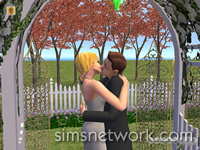 Once stories have been created using storytelling mode, The Sims 2 will make it much easier to share it with the world at large. You'll be able to upload and update your stories on TheSims2.com effortlessly and from right within the game. In addition, you can now choose between a traditional filmstrip-style storyline or the ever-popular "blog" style of display, where readers can see multiple entries at once alongside the text that brings those stories to life.
Once stories have been created using storytelling mode, The Sims 2 will make it much easier to share it with the world at large. You'll be able to upload and update your stories on TheSims2.com effortlessly and from right within the game. In addition, you can now choose between a traditional filmstrip-style storyline or the ever-popular "blog" style of display, where readers can see multiple entries at once alongside the text that brings those stories to life.
Creating and sharing stories in The Sims 2 is ultimately a more powerful and compelling experience than ever before. What makes us most excited is to think how much more fantastic it will be once the community of our players finally get their hands on the game and its new capabilities. There are extraordinary stories out there that no one but the storytellers can possible imagine. All we have to do is make these tools available, and we know that crazy, outrageous, dramatic, hilarious, and moving stories will start being created and shared.
Kissing, spying, a cheerleader obstacle course, helicopters, dorm rooms, and Sims getting busted are all just part of another day here at TheSims2.com
We'll be out for the holidays, so there will be no chat or events until the week of January 5th. Until then, have a safe and happy season!
"Apropos the season where "you better be good, you better be nice," GameSpot sought out Will Wright to investigate the nuances of the The Sims 2..."
Q&A: Mapping Will Wright
By Curt Feldman
Maxis chief, and the brain trust behind Sim City and The Sims, talks up the return of the Sims.
Apropos the season where "you better be good, you better be nice," GameSpot sought out Will Wright to investigate the nuances of the The Sims 2, the Maxis-designed game that rewards good behavior with a good life: raise your kids well and they'll grow up all nice and sweet.
But the game also gives gamers the choice of acting out their bad selves as well--for fun and, as we've seen in The Sims Online, sometimes for profit.
With Christmas just a few days away, GameSpot shared a glass of good cheer with Will Wright.
GameSpot: In The Sims 2, players can choose to live a good life, or opt to live one that's bad. Which direction to you predict most Sims 2 players will choose to?
Will Wright: You know, that’s like kind of a no-brainer. I think everybody tries the bad side.
GS: What do read into the people choosing to be bad? How do the two--good and bad-- relate?
WW: I think by exploring the bad side you’re really just mapping the envelope of the system…you're getting a sense of how far off you can go. The good side is more of your creative palette. For example: Now I’m going to sit down and I’m going to do my favorite family, or I’m going to tell a story, or I’m going to re-create my favorite sitcom or whatever. I think that side feels like it’s a bit broader creatively. Everybody has a different definition of the good side. So that’s probably a more expansive landscape that people will explore. And that’s where people get more imaginative, in a sense, and it also reflects more on their personality. The bad side just a kind of exploration.
GS: In The Sims, players had to dig for ways to explore non-traditional, even subversive, behavior…affecting a homosexual identity, for example. Yet it seems in the pre-release materials for The Sims 2 that you’re flaunting that ability to deviate from conventions from the start.
WW: [In The Sims 2] I think things are a little more obvious and a little more varied. You know, in the original Sims we had some ESRB issues that we were testing--and trying to get a feeling for what we could get away with. That’s one part of it. The other part is, you know, players obviously enjoy being subversive to some degree. And so we want to provide that and let them know that we’re on their side in that way.
With the expansion packs, we got a pretty good feeling of how far we could go in each direction. But on top of that, there are things that we call “design subversion.” There are a lot of things which can be cheats or bugs or exploits or whatever, that are undersigned subversions. These are almost as important [to gamers], if not more so. Players like to know that they’ve discovered things that even the designers didn’t know were in the game. I’m not saying we purposely introduced bugs or anything, but this is kind of a natural result of any complexities of software…that you can’t fully test it.
GS: Does that entertain you, you know, when you find out that you’ve been outed, bug-wise?
WW: Oh, yeah. I’ve been seeing that a lot in TSO, where people are--and I don’t know how they discover these things, but they discover these elaborate animation bugs where, if you put a couch there and a thing there, and you stand there, and you do this elaborate sequence, then that can cause an animation bug. It becomes almost a form of social currency in the game, where one player can then show another player, oh, look at this cool thing I’ve figured out.
It’s almost more like a treasure hunt. They want to find all the different kinds of weird dysfunctions in the game that they can.. And every now and then people find the bugs, and they interpret those as cool failures in the Sims terms. For them it’s like a treasure hunt, you know.
GS: Is game design a naturally subversive activity--or is it just you? Or is that a bit too psychoanalytic…
WW: Well, when you say subversive, it’s just another form of a player taking control. I think for most people, their kind of general aesthetic with games is that the more I control this experience, the better the game is. And I don’t mean control in terms of I can always win by pressing a button, but control in terms of I can choose to go off into an interesting path, and the game will support that path.
This animal we’re calling subversion is really just empowering the players to not hit walls as often. A lot of these bugs we could prevent just by reining in the scope of the game design You know, it’s the fact that that territory, that that landscape is so large that we cannot possibly test it that gives rise to these things. At a fundamental level it’s kind of convergent with what I would call “good game aesthetics.”
GS: Speaking both generally, but with the Sims 2 squarely in our sights, are there dangers in sequelizing a successful franchise?
WW: The Sims is kind of an interesting case because we had all these expansion packs. We were able to incrementally add on and explore without invading the core dynamic or the core game play. [With The Sims 2], we’re throwing everything away and starting over with a fresh canvas. We’ve got a lot of issues around things like the platforms and the performance, having a 3D camera that you’re navigating…challenges for the player and for the developers that are becoming risk items.
GS: What's the primary challenge?
WW: Especially with a successful [game] like The Sims, you have to balance your fear of not dropping the ball with the danger of being overly conservative. And that’s something that I think we’re starting to learn to manage better. In some sense that fear of not dropping the ball can really hurt you, in terms of not stretching and kind of going off in interesting new directions.
The problem is you’re trying to target the current gamers, rather than lead them. What you really need to be doing is leading them. You need to pick which direction you think they’re going to want to go. And if you pick the wrong direction, and they all of a sudden take a turn to the right, you’ve got a mess.
GS: What's the natural inclination?
WW: It feels safer to actually target them and not lead them. But what that really does is limits your upside. You know, it’s probably limiting your downside, too. But if you want the next [title] to be a bigger hit, to really reach its full potential, I don’t think you can afford to do that.
GS: How did you lead in The Sims 2?
WW: Well, I think the camera freedom is something that we’ve resisted for a long time and feels like probably the biggest stretch. But it has some huge benefits. You can zoom in very close and feel totally immersed. You can even do like a walkthrough and be at that level, where you’re actually standing in the house, Sim point of view. You can see their faces because we’re bringing the camera in so much closer. Of course, you know, the kind of cost of that is that we have to provide a huge amount of detail on the characters and the objects now.
That feels like the biggest, most obvious thing that players are going to see. Now a lot of things flow out of that…there are repercussions, things like The Sims’ awareness in the simulation has to be much deeper to support them at that level, the quality of the animations has to be higher. But on the other hand, the build mode is much more fun. So we have much more open-ended kind of creative directions in the architecture.
The second thing for me, probably a few clicks down, is the idea that The Sims smoothly age and have different concerns and motivations and needs at different age ranges. It becomes more of an epic, almost Michener-like multigenerational thing…the story that you’re playing through.
GS: Can the The Sims 2 possibly convert as many non-gamers as the original title did?
WW: We’re hoping that. I think when you look over somebody’s shoulder playing The Sims 2, it is definitely more compelling to watch. So maybe people who had looked over the shoulder of somebody playing The Sims 1, and they saw it, and it looked kind of cartoony and low-res, and they didn’t really understand the open-ended nature of it, I think the same people might have a different impression looking at this. It just looks more cinematic and the characters, their behavior, seem more compelling.
GS: Do you see a danger in spending too much time in this electronically mediated space? The space you are making even more compelling with The Sims 2?
WW: There’s an interesting question about what’s the difference between listening to a voice or reading text, or what’s the bandwidth between two people. What's the actual data bandwidth as we talk to each other? Is it more or less over different forms of, you know, electronics?
But the bigger thought in my mind is the fact that we’re inventing and adapting to these alternate topologies…social topologies, basically. It used to be that you knew your neighbors and maybe your coworkers--the people in your physical vicinity. In some sense our phone network is kind of pretty closely mapped to that physical topology. As we move onto the Net, we have an entirely different set of topologies that are based around special interests and forums and bulletin boards, chat rooms. And online games are their own kind of form of topology. And so we can have groups of friends that I know in the office, and my neighbors, and also ones that are playing this online game with me, or ones that hang out with at this particular website that reflects my hobby, and that I interact with over a bulletin board.
I think everybody in their head has a map of each one of these topologies and where they fit into it. They have local landmarks that they’re familiar with and places that they visit often--and places that they visit very seldom. It's kind of amazing how many of these maps a person can hold in their head.
GS: Do you ever unplug from that electronically mediated map, that web-based topology?
WW: On vacation, I totally unplug. I don’t bring a laptop with me.
GS: Are you happy to come back and plug back in?
WW: Oh, usually I’m pretty neutral about it. When I come back, I’m looking forward to catching up on the stuff that I missed. But on the other hand, you find yourself left with so much more time. I find it refreshing to unplug from it for a while. You kind of forget how deeply you get embedded in it.
GS: 'It' being what?
WW: It’s almost a situational awareness. When you’re sitting in a restaurant, for instance, you are keeping track of people behind you, or people with hot food that they might spill on you. You have this situational awareness. Some of it security based, some of it socially based, as is: Oh, I know the guy that just walked into the room. On the Net, I think people have another, a different kind of kind of situational awareness, especially if they’re participating into online discussions or playing online games. You kind a little map in your head of kind of where you are in relation to this other stuff.
And maintaining that map comes with its own cost.
GS: When you unplug, that's the map you throw away.
WW: Right.
GS: Will, have you ever been in a small plane?
WW: Yes…well, I used to have a pilot’s license.
GS: Thanks, Will, for your time. Enjoy your vacation.
WW: Thanks.
Here are 5 new official screenshots from IGN!
5 New official screenshots on GameSpot


